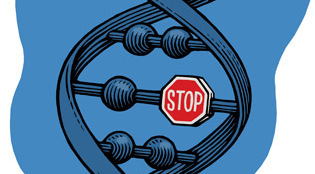 loading
loading
FindingsTurning cancer off Gregory NemecView full imageEach of us starts out as a single fertilized cell, which multiplies exponentially. But the cells of most mature organisms need to stop multiplying—requiring a “start and stop” mechanism. In a cancer cell, that stop signal has been altered, and the cell multiplies abnormally. Alan Garen, a professor of molecular biophysics and biochemistry, and Xu Song of Sichuan University in China have discovered a mechanism controlling multiplication in tumor cells. The mechanism consists of a protein called PSF, which stops multiplication by attaching to the genes that drive it and blocking their function. PSF also attaches to certain large RNA molecules. When the RNA binds to PSF, it reactivates cell multiplication. These RNAs are present in embryonic cells, disappear in cells that have stopped multiplying—and reappear in tumor cells. Garen and Song and their students showed that increasing the amount of PSF or decreasing the amount of the RNA in tumor cells stops tumor growth in a mouse model of human cancer. They hope to develop procedures that will translate these results into plans for effective and safe clinical trials.
The comment period has expired.
|
|